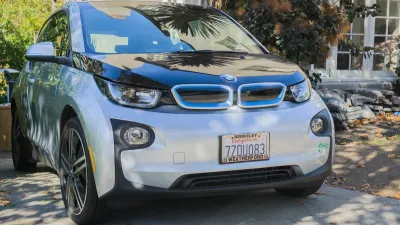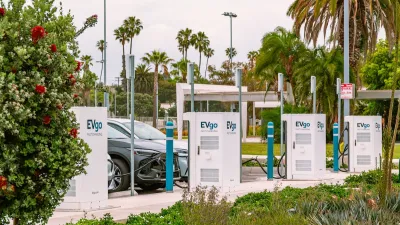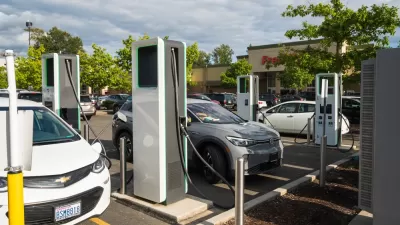With more states outlawing the sales of gas-powered vehicles and the federal government setting ambitious electrification goals, now is the time to invest in critical charging infrastructure.

As policymakers strive to encourage the adoption of electric cars, cities have to contend with finding locations for drivers to charge their vehicles. Henry Grabar reports on the urgent need for more electric car chargers in public parking areas which can serve EV owners living in multi-family buildings who lack access to home charging infrastructure.
According to Grabar,
Many cities are experimenting with EV charging at the curb, and extension cords have been spotted hanging from the windows of East Village tenements and Boston triple-deckers. Street parking has long been a lawless affair, and so far, electric vehicle charging at the curb is working much the same way: every driver for him or herself.
The lack of a concerted effort to bring charging infrastructure to denser neighborhoods, argues Grabar, "raises the possibility that gas-powered cars will continue to dominate in neighborhoods with multifamily housing, and the promise of cleaner air will remain unfulfilled in exactly the places that have suffered the most from the many harms of automobile exhaust."
Grabar goes on to describe the variety of electric vehicle chargers on the market and what he calls the "multidimensional infrastructural problem" that creating a comprehensive charging network poses.
Last month, a group of five Midwestern states joined forces to develop REV Midwest, a network of EV charging stations that will focus on supporting EV adoption in their states, and more states are passing zero-emissions statutes that will prohibit sales of gas-powered vehicles in the next two decades, creating an imminent need for robust charging networks. Meanwhile, the federal infrastructure bill being debated in Congress proposes allocating $7.5 billion to charging infrastructure.
FULL STORY: Where the Heck Are We Going to Charge All of the Electric Cars?

Planetizen Federal Action Tracker
A weekly monitor of how Trump’s orders and actions are impacting planners and planning in America.

Maui's Vacation Rental Debate Turns Ugly
Verbal attacks, misinformation campaigns and fistfights plague a high-stakes debate to convert thousands of vacation rentals into long-term housing.

San Francisco Suspends Traffic Calming Amidst Record Deaths
Citing “a challenging fiscal landscape,” the city will cease the program on the heels of 42 traffic deaths, including 24 pedestrians.

Amtrak Rolls Out New Orleans to Alabama “Mardi Gras” Train
The new service will operate morning and evening departures between Mobile and New Orleans.

The Subversive Car-Free Guide to Trump's Great American Road Trip
Car-free ways to access Chicagoland’s best tourist attractions.

San Antonio and Austin are Fusing Into one Massive Megaregion
The region spanning the two central Texas cities is growing fast, posing challenges for local infrastructure and water supplies.
Urban Design for Planners 1: Software Tools
This six-course series explores essential urban design concepts using open source software and equips planners with the tools they need to participate fully in the urban design process.
Planning for Universal Design
Learn the tools for implementing Universal Design in planning regulations.
Heyer Gruel & Associates PA
JM Goldson LLC
Custer County Colorado
City of Camden Redevelopment Agency
City of Astoria
Transportation Research & Education Center (TREC) at Portland State University
Jefferson Parish Government
Camden Redevelopment Agency
City of Claremont





























